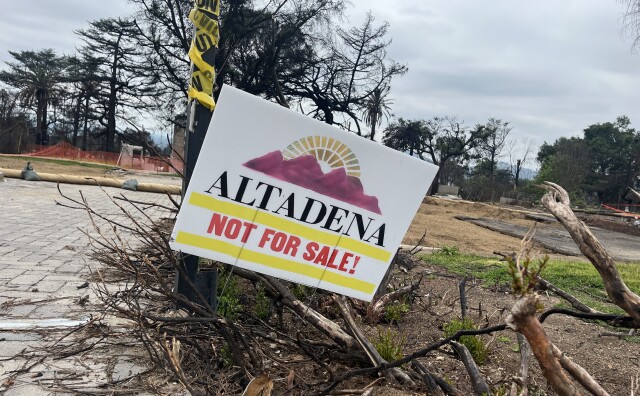With our free press under threat and federal funding for public media gone, your support matters more than ever. Help keep the LAist newsroom strong, become a monthly member or increase your support today.
Daniel Bernard Roumain's 'Dred Violin'



Daniel Bernard Roumain doesn't fit the image of a classical musician. The Haitian-American violinist and composer sports a silver nose ring and dreadlocks that reach to his waist. Roumain has coined a name for his style: "dred violin."
Roumain is classically trained, but he gets just as much inspiration -- maybe more -- from jazz, rock and hip-hop.
"The notion of what the violin represents and its history has nothing to do with what I represent," Roumain says. The dred violin "means more than black and white; it means a mixing -- a mixture, literally," he says.
Roumain has his own nine-piece band, DBR & THE MISSION, which includes a string quartet, a rhythm section and a DJ, who beat-boxes and scratches.
"What I set out to do was make the violin more reflective of who I am, and what I'm into," Roumain says. Rather than play the classics as they have been throughout the ages, he wonders where his culture fits into the mix. "Where does blackness come into play in the violin -- and more than that, where does hip-hop come in?"
Roumain was raised in South Florida. He started playing violin when he was five. He did graduate studies under the Pulitzer Prize-winning composer William Bolcom. Now, Roumain has big-name collaborators, including the minimalist composer Philip Glass and choreographer Bill T. Jones. And he's got 10 commissions lined up, including a guitar concerto for the virtuoso Eliot Fisk, and a laptop concerto.
Roumain thinks his best work yet is his recently completed fifth string quartet, which was commissioned by the Lark Quartet. In one movement, the members have to clap, a feature he says was inspired by hip-hop rhythms but dates back to Cro-Magnon man. "There's something really communal about that," he says.
Copyright 2022 NPR. To see more, visit https://www.npr.org. 9(MDA1OTI3MjQ5MDEyODUwMTE2MzM1YzNmZA004))
At LAist, we believe in journalism without censorship and the right of a free press to speak truth to those in power. Our hard-hitting watchdog reporting on local government, climate, and the ongoing housing and homelessness crisis is trustworthy, independent and freely accessible to everyone thanks to the support of readers like you.
But the game has changed: Congress voted to eliminate funding for public media across the country. Here at LAist that means a loss of $1.7 million in our budget every year. We want to assure you that despite growing threats to free press and free speech, LAist will remain a voice you know and trust. Speaking frankly, the amount of reader support we receive will help determine how strong of a newsroom we are going forward to cover the important news in our community.
We’re asking you to stand up for independent reporting that will not be silenced. With more individuals like you supporting this public service, we can continue to provide essential coverage for Southern Californians that you can’t find anywhere else. Become a monthly member today to help sustain this mission.
Thank you for your generous support and belief in the value of independent news.

-
The Palisades Fire erupted on Jan. 7 and went on to kill 12 people and destroy more than 6,800 homes and buildings.
-
People moving to Los Angeles are regularly baffled by the region’s refrigerator-less apartments. They’ll soon be a thing of the past.
-
Experts say students shouldn't readily forgo federal aid. But a California-only program may be a good alternative in some cases.
-
Distrito Catorce’s Guillermo Piñon says the team no longer reflects his community. A new mural will honor local leaders instead.
-
The program is for customers in communities that may not be able to afford turf removal or water-saving upgrades.
-
More than half of sales through September have been to corporate developers. Grassroots community efforts continue to work to combat the trend.







